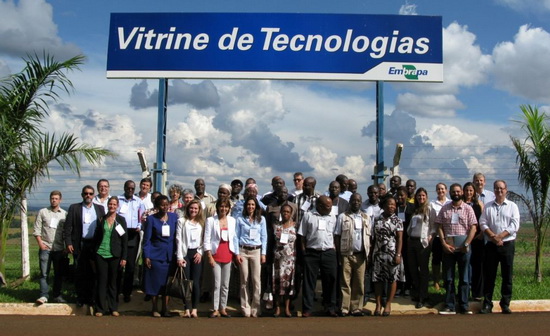
African Stakeholders Tour Brazil Biotech Crop Fields
April 8, 2015| |
ISAAA AfriCenter, in collaboration with EMBRAPA - Brazilian Agricultural Research Corporation and SCIFODE who are implementing an Africa-Brazil Marketplace project, organized a study tour to Brazil. Twenty-nine (29) participants from 5 African countries (Burkina Faso, Kenya, Mozambique, Nigeria and Uganda) joined the tour. The African Biosafety Network of Expertise (ABNE) was also involved as co-organizer of the tour.
The countries have great potential for increasing production by adopting biotech crops specifically soybean but (apart from Burkina Faso) they are locked in biosafety debates that have slowed down and in some cases stopped the safe and responsible use of the technology. Africa stands to learn numerous lessons from Brazil's experience with regulatory approval and adoption of biotech crops and specifically soybean. Brazil's biosafety regulatory process has not been without challenges, but today the country has a Biosafety Act (11.105/05) enacted in 2005 that has allowed commercialization of various biotech crops making it the second largest producer of biotech crops in the world with 42.2 million hectares after USA.
Thus, the goal of the study tour was to facilitate exchange of experiences among the African countries and Brazil to help unlock the existing stalemate in biosafety regulatory process. This is expected to influence the enactment of science-based cost/time-effective biosafety regulatory systems that will allow adoption of biotech crops with the potential of increasing agricultural productivity and ultimately reducing food insecurity.
The participants included soybean growers, breeders, regulators, policymakers and private sector representatives involved in soybean processing. The team was joined by a farmer and a Ministry of Agriculture official from Argentina which is the third largest producer of biotech crops in the world. Participants visited both large- and small-scale biotech soybean and maize farmers in Londrina County and held exhaustive discussions with the farmers who clearly enumerated the benefits of biotech crops. Farmers talked about the reduction in the cost of production, increased yield and quality of their crops. They also visited Cocamar Cooperative, one of the largest farmers' cooperatives in Maringa County. The Cooperative provides support to small and medium scale farmers by training in agronomic production, providing inputs at market prices and buying farmers' produce.
Participants visited EMBRAPA and interacted with researchers involved in biotech crops research who elaborately explained and showcased the state of the art laboratories they are using.
For more information, please contact: Dr. Faith Nguthi fnguthi@isaaa.org.
| |
Biotech Updates is a weekly newsletter of ISAAA, a not-for-profit organization. It is distributed for free to over 22,000 subscribers worldwide to inform them about the key developments in biosciences, especially in biotechnology. Your support will help us in our mission to feed the world with knowledge. You can help by donating as little as $10.
-
See more articles:
-
News from Around the World
- World Health Day Highlights Food Safety
- UN Urged to Ensure Open Access to Plant Genomic Data
- African Stakeholders Tour Brazil Biotech Crop Fields
- COMESA Regional Biotechnology and Biosafety Policy Implementation Plan Validated
- New Study Reveals How Plants Shed Off Parts
- EPA Approves Enlist Duo Herbicide in More States
- Study Shows Rice can Borrow Stronger Immunity from Other Plant Species
- Researchers Point to Prickly Lettuce for Rubber Production
- Pun1-encoded Protein Determines Capsaicin Levels in Capsicum
- GM Corn Seeds Introduced to Vietnamese Farmers
- Berry Color Variation in Grapevine Identified
-
Research Highlights
- New Strategy in Identifying SNP in Cotton Genome
- Improved Cold Storage Traits of Potato through Targeted Gene Knockout
- Wheat Homolog of the Yeast ATG6 Gene are Involved in Autophagy and Powdery Mildew Immunity
-
Beyond Crop Biotech
- Temple Researchers 'Delete' HIV Virus from Human DNA
-
Read the latest: - Biotech Updates (April 17, 2024)
- Gene Editing Supplement (April 10, 2024)
- Gene Drive Supplement (February 22, 2023)
-
Subscribe to BU: - Share
- Tweet

